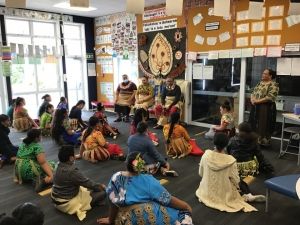

Form 7 students in Tonga. Photo/RNZ Eleisha Foon
Academic tests should include Pacific languages - former principal
A former principal argues mandatory testing should be done in a child’s mother tongue, amid concerns Pacific students will be disadvantaged by doing a test in English.



Moana Pasifika end Lautoka curse to win 'Battle of the Pacific'


A.R.T sets new Pacific music pace with ‘First Thursday’ releases



Moana Pasifika end Lautoka curse to win 'Battle of the Pacific'


A.R.T sets new Pacific music pace with ‘First Thursday’ releases
A Sāmoan language advocate says five-year-olds should be able to take school tests in their first language and schools should be able to carry out learning evaluation that suits bilingual learners.
This comes as the government has announced schools will be required to test five-year-old students on the ability to link sounds and letters. This comes into place next year, and children will be tested at the 20 and 40 week mark.
Fa’atili Iosua Esera warns there are risks of forcing the test on students who are not fluent in English.
“It does not do the children any good at all, and if you assess them for something they really do not know, then all you're doing is actually harming their self-confidence and their confidence in themselves.”
Speaking to William Terite on Pacific Mornings from his former school, Sutton Primary, Fa’atili still speaks like he’s part of the team.
“My school here, we still report to the board every term in terms of the student achievements in maths, reading and writing.
“When they get to year 3, we report how well they read and write in Tongan, Samoan, and reo Māori, but we also report to the board on how well they read and write in English.”
Fa’atili said schools could consider their own alternative in Pacific languages, or have the option to opt out and continue their existing assessment scheme.
“At the heart of every school should be the children's learning, and if they see no purpose in implementing such an assessment, then they should say that they're not going to do it.
“If you know that implementing such an assessment regime will harm your children, then you actually have the right to say no, without breaking the law.
“If they go to a mainstream school, [parents] could have the right to say, ‘my child will be exempted from these mandatory assessments in English until year three, or until year whatever’.”
Fa’atili has been principal of three schools, and was made a Member of the New Zealand Order of Merit for services to Pacific education last year. He founded a national organisation of Sāmoan teachers, along with initiating Sāmoan Language Week in 2006.

Students celebrate Tongan language week at Sutton Park School in 2020. Photo/Facebook
Fa’atili advocates for bilingual education and said children can become proficient in both their Pacific language and English, but warned it must be done properly.
“Samoan and Tongan children can be truly bilingual at year 6, and we're proving that with our data here at Sutton Park, that our children can actually become bilingual and perform at similar levels in two languages as early as year 6, if you do it well.
“[But ] if the program is not suitable for the children, you can also end up harming both languages where the children do not speak English well enough, and do not speak Sāmoan or Tongan well enough.”
English opportunities
Associate Education Minister David Seymour said standardised testing in English is important for future opportunities.
“There's a number of schools I've talked to in recent years who have a lot of students from China who have very limited English. They may have not really spoken English up to the age of four, then they moved to New Zealand. There's certainly people from the Pacific nations who may be in a similar situation.
“There's a billion people in the world who have learnt English as a second language because it shows that it presents the opportunity to succeed in the modern global economy.”
Seymour said the test shouldn’t be something to run away from.
“The question is not, ‘can we make everything easy and have everyone pass the test’? The question is, are we going to put the test there so people can find out how they're doing and either change what they're doing or take a different approach or try harder or whatever?”
“Are we going to just have no test and ignore reality and ignore the opportunity?
“I think that actually the cruel thing is to deny reality and tell kids they're doing well when they may not be. The kind thing is to actually put up a test there and say ‘have a go’.”
Seymour is leading the call to reintroduce charter schools, and said he supports choice in education.
“If you look at Sir Michael Jones, if you look at Sita Selupe, both operating Pacific-oriented charter schools, often the community knows more about how to engage the children than the Ministry of Education in Wellington.
“So my view is let's have choice, but also let's make sure that we have common standards that actually tell every kid what it's going to be like to be an adult in the modern world.”
Watch the full interview on Pacific Mornings with Fa'atili Iosua Esera: